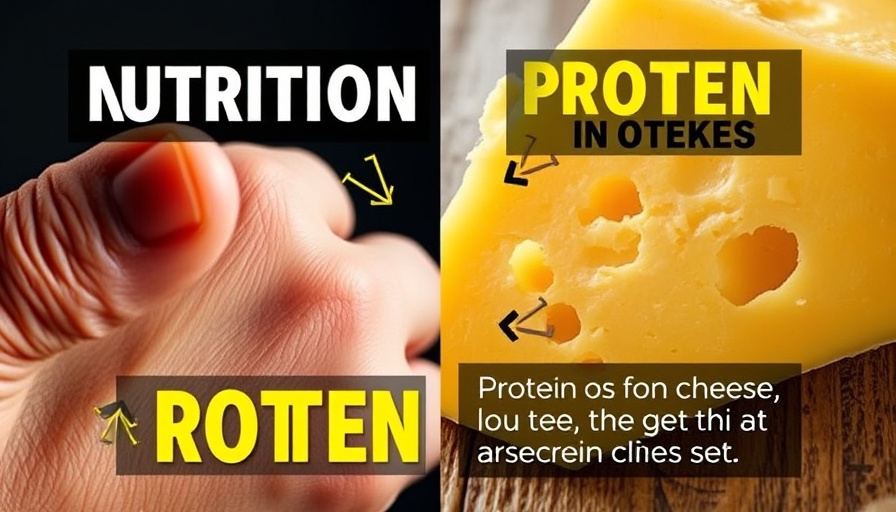
Rediscovering Strength Post-60: The Importance of Protein
As we enter the golden years, it’s common to feel a gradual decline in strength. If getting up from your favorite chair feels more like an Olympic event, you’re not alone. After age 60, muscle loss accelerates, especially in men who can lose leg strength at a staggering rate. However, this isn’t just a simple consequence of growing older; it stems from a process known as anabolic resistance. This condition creates a barrier impairing the body’s ability to utilize protein effectively, leading to that unwelcome feeling of weakness.
In THIS Food Has More Protein Than Eggs - Prevent Muscle Loss After 60 Naturally, the discussion delves into the crucial nutritional shifts necessary for maintaining muscle strength as we age. This video has highlighted key insights that inspired us to explore practical approaches for seniors looking to enhance their health and mobility.
The Secret Weapon: Greek Yogurt
The key to counteracting this muscle loss? Nutrition. Research reveals that one powerhouse food exceeds even eggs in protein during this critical phase of life: Greek yogurt. A single cup offers not only 17g of protein but also a generous 2.5g of leucine, a crucial amino acid known to stimulate muscle growth effectively, especially in seniors.
Take Frank, for instance. Before discovering the benefits of Greek yogurt, he relied on two eggs every morning, yet struggled with daily activities. After swapping eggs for Greek yogurt within 30 minutes post-walk, his experience transformed within weeks. The stairs didn’t feel daunting anymore, and he noticed reduced post-yard work soreness. It speaks to the profound impact of choosing the right protein source, especially for those over 60.
Unlocking Muscle Growth with Leucine
Many assume muscle growth is solely about weightlifting, yet a biochemical understanding reveals a different story. The real driver of muscle development lies within the cellular process. With age, the mTOR pathway—essential for muscle protein synthesis—often becomes sluggish. This is where leucine comes into play. Frank learned that to activate mTOR effectively, he needed meals rich in leucine, presenting a necessity for regular protein intake that meets his body’s shifting needs.
The Gut-Muscle Connection: A Vital Aspect of Absorption
As we age, our digestion tends to slow down, leading to what experts term the 'gut-muscle barrier.' This phenomenon can limit nutrient absorption, negating the efforts of a high-protein diet. Frank’s struggle didn’t dissipate just with better protein; he also had to focus on the health of his gut. Integrating fermented foods like tempeh and taking probiotics markedly improved his digestion, ensuring that those critical nutrients actually reached his muscles.
Essential Eating: The Senior Protein Blueprint
So what does a day of healthy eating look like for optimal muscle maintenance? Frank’s adjusted diet revealed the negative impact of uneven protein distribution—consuming too little protein at breakfast but loading up during dinner. Instead, he restructured his meals to ensure approximately 30g of protein at every meal. Heres a snapshot of his new routine:
- Breakfast: 1 cup Greek yogurt, 2 boiled eggs, flaxseed
- Lunch: Grilled tempeh, quinoa salad, and pumpkin seeds
- Dinner: Baked salmon, steamed edamame, and lentils
This simple yet calculated change supported his muscle recovery and strength more effectively than he could have anticipated, reinstating confidence in his movements.
From Weakness to Stability: Frank's Inspiring Journey
Frank wasn’t aware of how food could play such a pivotal role in addressing his muscle strength. He transitioned through subtle dietary shifts, which avoided extreme routines or complex tracking. Just by consuming strategic meals regularly, he felt himself regaining agility. After four weeks, the relief of feeling steadier and revitalized wasn’t just physical; it fostered interconnectedness with his family, now a joyful part of his daily routines.
The Reason for Hope: Simple Changes for Stronger Mobility
If this resonates with you, it’s essential to recognize that weakening muscles aren’t a fate of age but rather a shift that can be met with effective strategies for change. With a few thoughtful adjustments, like introducing Greek yogurt, enriching diet with leucine, and nurturing gut health, there’s every reason to maintain or regain strength into your later years.
As you navigate the quest for healthy aging, remember: it’s about ensuring your meals communicate effectively with your body, enabling the signals for muscle growth. Simple shifts in nutrition today can lead to stronger walks tomorrow. What small changes can you make to bolster your diet? Share your thoughts below!
 Add Element
Add Element  Add Row
Add Row 



Write A Comment